|
|
|
Sort Order |
|
|
|
Items / Page
|
|
|
|
|
|
|
| Srl | Item |
| 1 |
ID:
093902
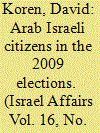

|
|
|
|
|
| Publication |
2010.
|
| Summary/Abstract |
The 18th Knesset currently seats 13 Arab and Druze MKs. This is one MK fewer compared to the corresponding figure in the 17th Knesset and the number of MKs representingpredominantly Arab parties hardly changed (increasing from 10 to 11). These minor changes are surprising considering the formative nature of the events in the Jewish-Arab arena during the three years since the last elections. The article suggests that the same events which intensified the Arab desire to separate from the Jewish majority - The Israeli operation in Gaza during December 2008-January 2009 ("Cast Lead") and the "Israel Beytenu" party's campaign which has placed the issue of Israeli Arabs' loyalty to their state at the top of its agenda - were the ones who motivated the Arabs to participate eventually in the elections to allay outcomes they perceived as deleterious to their interests.
|
|
|
|
|
|
|
|
|
|
|
|
|
|
|
|
| 2 |
ID:
174899
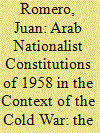

|
|
|
|
|
| Summary/Abstract |
Unlike many works on constitutions, this article focuses on non-legal aspects of the framing of Arab constitutions. This emphasis on the social and political in lieu of purely legal aspects of constitution-making allows us to place constitutions in a wider regional and not merely national context, and interpret them from a not strictly legal perspective. By adopting such an approach, historians can explain the extent to which the turbulence in the Arab world in the 1950s as a result of Arab nationalism, the creation of the state of Israel, the rivalry between revolutionary and monarchic Arab regimes, and the Cold War affected three Arab organic laws in the revolutionary year of 1958. This focus on contemporary social and political developments enables scholars to explain why the three different fundamental laws examined here reflect three different interpretations of Arab nationalism.
|
|
|
|
|
|
|
|
|
|
|
|
|
|
|
|
| 3 |
ID:
146710
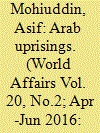

|
|
|
|
|
| Contents |
This article points out that the watershed events that initiated the period of contentious politics in the Arab world after 2010 not only reshaped regional and global politics but also challenged state power and long held theories dominant in the region, particularly about the popular acquiescence to regime control. They opened new areas of inquiry as well. By their impact on regional and international politics, these events have drawn the attention of scholars across the world. Some argue that these changes occurred as a result of the globalisation of democratic norms, new media technologies and regional structural changes, which led to widespread demonstrations, both violent and nonviolent. In calling for the downfall of the entrenched regimes, they signalled a breakdown of the social contract that had existed between the people and their rulers since independence.
|
|
|
|
|
|
|
|
|
|
|
|
|
|
|
|
| 4 |
ID:
092423
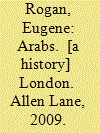

|
|
|
|
|
| Publication |
London, Allen Lane, 2009.
|
| Description |
vii, 533p.Hbk
|
| Standard Number |
9780713999037
|
|
|
|
|
|
|
|
|
|
|
|
Copies: C:1/I:0,R:0,Q:0
Circulation
| Accession# | Call# | Current Location | Status | Policy | Location |
| 054619 | 909.04927/ROG 054619 | Main | On Shelf | General | |
|
|
|
|
| 5 |
ID:
187318
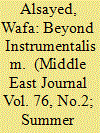

|
|
|
|
|
| Summary/Abstract |
The international relations literature on Arabism overwhelmingly views the behavior of Arab states through an instrumentalist lens. This article departs from this approach, arguing that Kuwait's Arabist foreign policy in the 1960s and 1970s largely stemmed from its distinctive history, which produced a prevailing pan-Arabist current in society evident in the mainstream press and official discourse. A combined historical-sociological and constructivist approach is used to disentangle the relationship between history, identity, and foreign policy.
|
|
|
|
|
|
|
|
|
|
|
|
|
|
|
|
| 6 |
ID:
174596


|
|
|
|
|
| Summary/Abstract |
The decade of 1950–60 was unique in terms of the establishment of a supranational Arab union, known as the United Arab Republic. However, this union was ill born due to certain frictions between Arab states in the Middle East. There were divergences between the visions of Arab Nationalism for each state and this caused a troubling process for this supranational initiative. This study considers these frictions as the main reasons behind why the UAR was an unsuccessful attempt and further why the Arab Nationalism dissolved afterwards. The divergence between two competing visions of Arab Nationalism is symbolized through the competition between Iraqi prime minister Abd al-Karim Qasim and Egyptian president Gamal Nasser. The domestic, regional and global circumstances for these two countries and their leaders are analyzed in order to illustrate how these frictions became a reality and divided the Arab stance.
|
|
|
|
|
|
|
|
|
|
|
|
|
|
|
|
| 7 |
ID:
180355
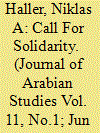

|
|
|
|
|
| Summary/Abstract |
While the contemporary political and economic ties between the Gulf region and the Levant are widely acknowledged, the deeper historical roots of this modern relationship are rarely recognized in light of persistent narratives of the Gulf’s relative isolation before the discovery of its hydrocarbon wealth. Building on a study of the British archival record, this article contributes to a challenge of such narratives by examining one of the earliest instances in which mutual ties became manifest: the political and financial support for the Arabs of Palestine by the population of the Trucial States (the contemporary United Arab Emirates) in the interwar years. As is shown, the development of pro-Palestinian sentiment was enabled not only by an earlier expansion of education in the Trucial States, but also by rapidly developing communication links between the Gulf and the wider Arab world. As a result of these developments, the population of the Trucial States was subject to –– and proved receptive to –– calls for Arab and Muslim solidarity emanating from Palestine in the late 1930s.
|
|
|
|
|
|
|
|
|
|
|
|
|
|
|
|
| 8 |
ID:
148606
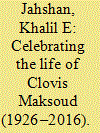

|
|
|
|
|
| Summary/Abstract |
On 15 May 2016, the Arab-American community lost one of its most prominent and admired members, the renowned diplomat, academic, journalist, and intellectual, Clovis Maksoud. In addition to his distinguished service as Arab League ambassador at the United Nations, to the United States, and to India and Southeast Asia, Maksoud was a lifelong advocate of the Non-Aligned Movement, Arab nationalist, and champion of the Palestinian cause. In this remembrance, colleague and Arab-American activist Khalil Jahshan eulogizes Maksoud with both warmth and humor.
|
|
|
|
|
|
|
|
|
|
|
|
|
|
|
|
| 9 |
ID:
126733
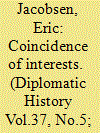

|
|
|
|
|
| Publication |
2013.
|
| Summary/Abstract |
This article will demonstrate that in 1963 the administration of President Kennedy helped create a Ba'th regime in Iraq and then provided it with assistance in order to secure U.S. interests, including access to oil and the containment of both Communism and Arab nationalism. On February 8, 1963, the Ba'th overthrew the dictatorship of General 'Abd-ul-Karim Qasim, an Iraqi nationalist who was seen by both the Eisenhower and Kennedy administrations as a threat to U.S. interests. U.S. policy makers provided the Ba'th regime with military and economic assistance, including sales of military equipment, credits for agricultural surpluses for credit under Public Law 480, and Export-Import Bank loans. Policy makers also encouraged private U.S. businesses to sign contracts with Iraq, supplied the Ba'th regime with ammunition to use against Kurdish rebels, used the Central Intelligence Agency to provide it military equipment, and ignored the Export-Import Bank's policy that prohibited financing arms sales.
|
|
|
|
|
|
|
|
|
|
|
|
|
|
|
|
| 10 |
ID:
038482
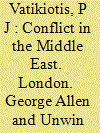

|
|
|
|
|
| Publication |
London, George Allen & Unwin Ltd, 1971.
|
| Description |
xvi, 224p.hbk
|
| Standard Number |
0043270360
|
|
|
|
|
|
|
|
|
|
|
|
Copies: C:1/I:0,R:0,Q:0
Circulation
| Accession# | Call# | Current Location | Status | Policy | Location |
| 008086 | 956.04/VAT 008086 | Main | On Shelf | General | |
|
|
|
|
| 11 |
ID:
049972
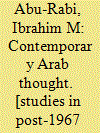

|
|
|
|
|
| Publication |
London, Pluto Press, 2004.
|
| Description |
xvii, 485p.Pbk
|
| Standard Number |
0745321690
|
|
|
|
|
|
|
|
|
|
|
|
Copies: C:1/I:0,R:0,Q:0
Circulation
| Accession# | Call# | Current Location | Status | Policy | Location |
| 047383 | 909.0974927/ABU 047383 | Main | On Shelf | General | |
|
|
|
|
| 12 |
ID:
114261
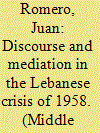

|
|
|
|
|
| Publication |
2012.
|
| Summary/Abstract |
The Lebanese constitutional crisis and civil war of 1958 were caused by a combination of domestic and international factors such as Arab nationalism, Cold War strategic thinking, and the Lebanese President Camille Chamoun's unpopular intention to amend the constitution to enable him to stand for re-election. This article argues that the crisis was resolved primarily thanks to the efforts of moderate Lebanese politicians and religious leaders. American mediators were involved in mediation attempts, but their contribution to the resolution of the conflict was made possible by the continuous efforts of the Lebanese themselves.
|
|
|
|
|
|
|
|
|
|
|
|
|
|
|
|
| 13 |
ID:
112442
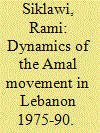

|
|
|
| 14 |
ID:
111933
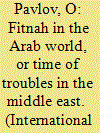

|
|
|
|
|
| Publication |
2012.
|
| Summary/Abstract |
NEARLY A YEAR HAS ELAPSED since the beginning of the Arab Spring; time has come to assess the preliminary results of the massive landslide started on a December day in 2010 by Mohamed Bouazizi, street vendor, who set himself on fire in a Tunis suburb to protest against police harassment and unemployment. This small stone set events in motion.
One after another the seemingly unshakable political regimes on the "Arab continent" were wiped out: two political doyens - Hosni Mubarak and Muammar Qaddafi - lost their "thrones"; President of Tunisia Zine El Abidine Ben Ali fled the country. Muammar Qaddafi lost even more than the throne - he lost nearly all his children and was shot through the head. Today when I am writing this article President of Yemen Ali Abdallah Saleh has come to the brink of resignation; King of Bahrain Khalifa still rules under pressure; the same can be said of President of Syria Bashar Assad. Reforms in Jordan are barely dragging on
|
|
|
|
|
|
|
|
|
|
|
|
|
|
|
|
| 15 |
ID:
039979
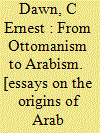

|
|
|
|
|
| Publication |
London, University of Illinois Press, 1973.
|
| Description |
ix, 212p.hbk
|
| Standard Number |
0252002024
|
|
|
|
|
|
|
|
|
|
|
|
Copies: C:1/I:0,R:0,Q:0
Circulation
| Accession# | Call# | Current Location | Status | Policy | Location |
| 012818 | 956.015/DAW 012818 | Main | On Shelf | General | |
|
|
|
|
| 16 |
ID:
066422
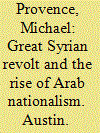

|
|
|
|
|
| Publication |
Austin, University of Texas Press, 2005.
|
| Description |
xiv, 209p.pbk
|
| Series |
Modern Middle East series; no. 22
|
| Standard Number |
0292706359
|
|
|
|
|
|
|
|
|
|
|
|
Copies: C:1/I:0,R:0,Q:0
Circulation
| Accession# | Call# | Current Location | Status | Policy | Location |
| 050265 | 956.91041/PRO 050265 | Main | On Shelf | General | |
|
|
|
|
| 17 |
ID:
104157
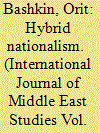

|
|
|
|
|
| Publication |
2011.
|
| Summary/Abstract |
This paper analyzes Iraqi national narratives in the years from 1958 to 1961 to consider how innovative definitions of Arab nationalisms were affected by worldwide processes of decolonization. It demonstrates how Pan-Arabism was transformed in Qasimite Iraq because of its hybridization with Iraqi patriotism and, concurrently, how various elements of Arabist discourses were integrated into local and patriotic perceptions of Iraqi nationalism. Examining cultural idioms shared by Iraqi intellectuals belonging to different political groups, especially the communists and the Ba?thists, destabilizes a typology that assumes each ideological camp subscribed to a rigidly defined set of well-known historical narratives. The Pan-Arabists in this period often cultivated the notion that Arab nationalism did not entail an ethnic origin but rather the ability to adopt the Arabic language, as well as Arab history and culture, as a marker of one's national and cultural identity. The attempts to adapt Pan-Arab discourses to the specificities of the Iraqi milieu and to build coalitions with as many of the nation's groups as possible meant that the sectarian, anti-Shi?i, and anti-Kurdish notions that colored Ba?thist discourses in later years were not as prominent in this period.
|
|
|
|
|
|
|
|
|
|
|
|
|
|
|
|
| 18 |
ID:
163316
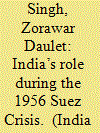

|
|
|
|
|
| Summary/Abstract |
The 1956 Suez conflict was not inevitable. The involvement of an impartial third party had offered an exit ramp for the main protagonists. Largely forgotten today, India strove to reconcile the interests of the Westerns powers with Arab nationalism. Displaying creativity and perseverance in attempting to arrest the sudden deterioration in security in its extended neighborhood, India’s unceasing but responsible support for a weaker Arab state in the backdrop of determined Western coercion is a useful illustration for contemporary policymakers who are attempting to craft a sustainable approach towards a tumultuous West Asia. Using previously unused archival documents, this paper adds to the small literature on India’s involvement in this crisis by offering the first detailed account of India’s attempt to prevent the outbreak of hostilities in those fateful months of 1956. By doing so, this article also reveals interesting facets of India’s approach to conflict management and regional stability in the 1950s, a role that was predicated on not just promoting strategic restraint between antagonistic states but also enabling conflict resolution options that preserved the vital interests of competing actors.
|
|
|
|
|
|
|
|
|
|
|
|
|
|
|
|
| 19 |
ID:
099023
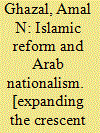

|
|
|
|
|
| Publication |
London, Routledge, 2010.
|
| Description |
xiv, 171p.
|
| Series |
Culture and civilization in the Middle East
|
| Standard Number |
9780415779807, hbk
|
|
|
|
|
|
|
|
|
|
|
|
Copies: C:1/I:0,R:0,Q:0
Circulation
| Accession# | Call# | Current Location | Status | Policy | Location |
| 055272 | 320.5409174927/GHA 055272 | Main | On Shelf | General | |
|
|
|
|
| 20 |
ID:
175052
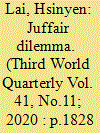

|
|
|
|
|
| Summary/Abstract |
This paper challenges ‘the myth’ of the demise of Arab nationalism after the Arab–Israeli War in 1967 that appears in the scholarship of international relations of the Middle East (IRME). I argue instead that Arab nationalism plays a constitutive role in ideologically linking the issue of Bahrain’s post-colonial state sovereignty and foreign policy on alignment, showing its political salience after 1967 in what I call ‘the Juffair dilemma’: the Al Khalifa regime’s dilemma in aligning with the US after Bahrain’s formal independence. Drawing on Antonio Gramsci’s ‘national-popular collective will’ to re-conceptualise Arab nationalism, the paper further argues that the impact of Arab nationalism on Bahrain’s alignment was revealed through a political struggle between the Al Khalifa regime and the Bahraini New Arab Left, corresponding to wider regional and international anti-imperialist movements in the context of the Cold War. This struggle manifested Arab nationalism as a non-collective will, in which ideological disconnections existed between ‘the people’ and the regime, in Bahrain. It then created the context where the issue of alignment was related to the contestation of sovereignty and the Palestinian question, which was the source of the Al Khalifa regime’s dilemma in making alignment with the US.
|
|
|
|
|
|
|
|
|
|
|
|
|
|
|
|
|
|
|
|
|